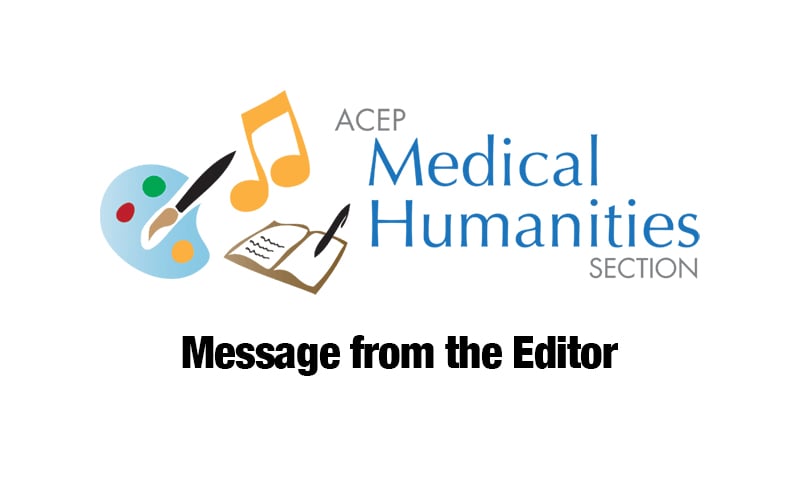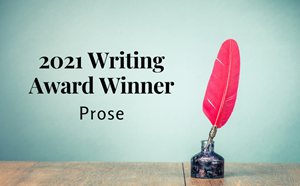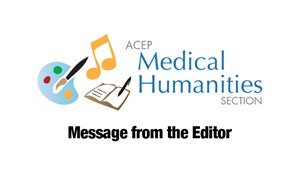
From the Editor
Peter J. Paganussi MD, FACEP
“The Year of Living Dangerously”: Reflections on a Pandemic.
As I write these words it is exactly one year to the day that the first COVID-19 death was reported here in the United States. Since that time over 460,000 lives have been lost in the United States and upwards of 2.3 million people have died worldwide. Approximately 60 million people have been infected with the coronavirus and recovered. My guess is “recovered” is a term used loosely. We will never completely recover from this nightmarish year, particularly those of us on the front lines of this pandemic. I am relatively sure it will remain with us forever. I have been a full-time emergency physician since 1988 and I have experienced nothing like it. Not even close. When I began my career, AIDS was raging. The horrors of watching mostly young men die from it have never left me but it sadly pales in comparison. By definition that was an epidemic. This is a pandemic. It is exponentially more serious.
While an undergraduate, at Fordham University in the late 1970’s, I took a course in English literature. The very first novel we read was “A Journal of The Plague Year” by Daniel Defoe. It recounts one man's experiences of the year 1665, in which the bubonic plague struck the city of London in what became known as the Great Plague of London, the last epidemic of bubonic plague in that city. I remember the novel quite vividly, especially since I was a Biology major. I found it gripping and, of course, quite chilling. I have never forgotten Defoe’s rich and vivid details; the graphically described deaths, the daily death counts, the mass graves, the deserted streets, etc. He particularly charted the suffering of the poor, their crowded living conditions and general squalor which added all the more to the perpetuation of the epidemic. Does any of this sound eerily familiar? Years later, on a visit to London, I accidentally happened upon the “Great Pit at Aldgate” which was one of the first mass burial sites described in the novel and it really made Defoe’s account come alive for me. After reading the historical marker at the site I ran for the nearest pub and downed a few pints of ale in an effort to elevate my spirit. Ever since the beginning of the coronavirus pandemic Defoe’s text has been foremost on my mind. Interestingly, prior to this pandemic, I have always felt it would be good to read in any Medical Humanities course. So I mention it here. It provides a window into the past that we could learn from. Perhaps some solace can be gained with the fact that it ended in about a year.
The other image that has rattled through my brain this year is the 1982 film “The Year of Living Dangerously” (directed by Peter Weir) which was based on a 1978 novel by Christopher Koch of the same title. Set in 1965 the story details a love affair, with Jakarta, Indonesia as the backdrop, during the overthrow of President Sukarno. Sukarno himself used the line for the title of his Indonesian Independence Day speech in 1964. The plot has nothing to do with this pandemic but it’s the title I keep coming back to. This has indeed, for just about everyone, been “The Year of Living Dangerously.” It has been especially dangerous for us in emergency medicine. Can we heal from this as a specialty, as a profession, as a country, as world, as a species? Will we ever? Only time will tell.
There will be stories to tell for years to come. And yes…there have been heroics. Science, “the candle in the darkness” (thank you Carl Sagan), has provided us with vaccines at “warp speed” to fight this deadly pestilence. Front line and rear guard physicians, nurses, respiratory therapists, technicians, EMS personnel, essential workers, etc, have battled valiantly to stem the tide of COVID’s destruction. While the death tolls and infection rates are daunting who can tell how much worse they might be without the aforementioned individuals who have pressed on, doing their/our jobs in the face of this dangerous virus? Perhaps a modern-day Defoe will chart our work in a similar seminal type novel.
I ask these questions honestly but also a bit rhetorically. As I have donned PPE multiple times per shift, I continue to ask myself:
When will all this sickness and dying end?
Will it ever end?
Can we recover?
Will we recover?
Is there any hope on the horizon?
Yes, I firmly believe there is hope. With a firm belief in science and its proper application there is always hope. Twenty-seven million Americans have received their first dose of a two-dose vaccine and 6 million have been fully vaccinated to date. A third vaccine, available as a single-dose regimen, is about to receive FDA approval and this should add significantly to the fight.
So I believe there is hope. I believe in you, my colleagues, who toil under this enormous weight but have not been completely broken by it. I believe the world can become whole again. We have shown we can indeed take care of each other. We will be the stronger and better for it. I just know it.
Thus, in this issue of MUSE , our Medical Humanities newsletter, we naturally reflect upon this year and this pandemic. Clearly this must be the theme. It really is the only one it could be. We will hear the voices, and see the works, from the hands of those who stand at the front line and push back against the deadly pestilence. Keep pushing my friends…better days are coming. We will end this Year of Living Dangerously and chronicle our own Journal of The Plague Year. We are the voices of those who bear direct and most intimate witness to it all. It is our story to tell and we will tell a part of it here.
Without introduction I will let each work speak for itself. They are powerful and moving; each in their own right. They come from colleagues on the front lines of this pandemic and delve into the varied and various impressions left by it all. We are very pleased to have the winners of the 2020 Medical Humanities Section Writing Awards (Prose & Poetry) and the Visual Arts winner to feast upon. And we have the voices of others who have contributed to this newsletter and the fight against the coronavirus. I am delighted, and very proud, to present them all to you. Sit back and let them be our very own “Journal of The Plague Year.”



